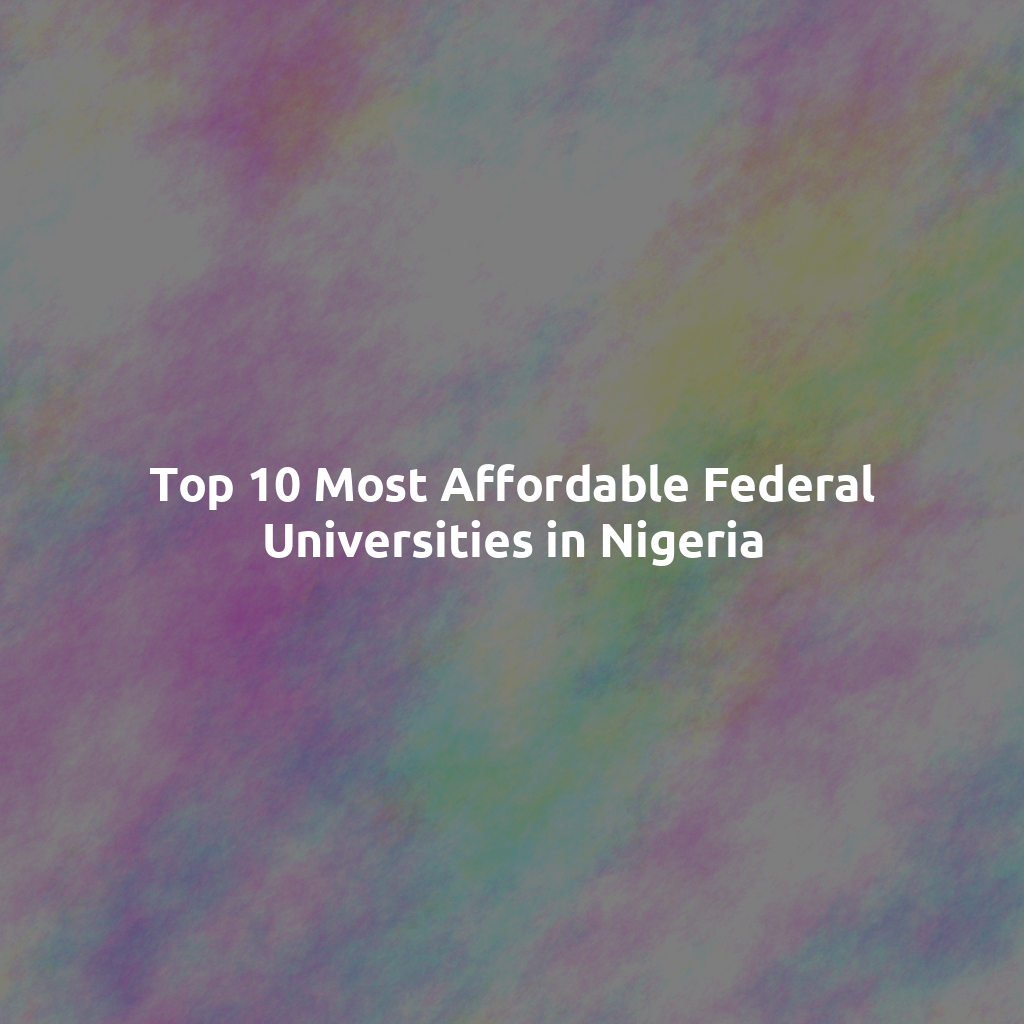Introduction to Affordable Higher Education in Nigeria
Nigeria offers a range of affordable options for higher education.
Many federal universities provide quality education at low tuition rates.
Students have the opportunity to pursue diverse fields of study.
Moreover, the government supports education to increase accessibility.
This initiative aims to promote literacy and skill development across the country.
Advertisements
Consequently, many prospective students find affordable paths to higher education.
Understanding the options available helps students make informed choices.
In this blog post, we will explore the most affordable federal universities in Nigeria.
Additionally, we will discuss the benefits of studying at these institutions.
Let’s delve into the world of affordable education in Nigeria.
Overview of Federal Universities in Nigeria
Nigeria is home to numerous federal universities offering diverse academic programs.
These institutions aim to provide quality education to students across the country.
Federal universities are typically funded by the federal government.
This funding helps maintain affordable tuition rates for students.
Moreover, these universities are strategically located in various geopolitical zones.
As a result, they serve a broad range of communities and regions.
Advertisements
Many students choose federal universities due to their reputation and affordability.
Additionally, these universities often have better facilities compared to private institutions.
Students benefit from a range of academic resources and extracurricular activities.
Overall, federal universities play a vital role in Nigeria’s educational landscape.
Types of Federal Universities
Nigeria’s federal universities vary in focus and specialization.
Many institutions offer courses in science, technology, arts, and humanities.
Some have specific foci, such as agricultural studies or health sciences.
These universities also provide undergraduate and postgraduate programs.
As a result, students can engage in various fields of study.
Affordability and Accessibility
Affordability remains a significant factor for students selecting a university.
Federal universities generally have lower tuition compared to private universities.
Government funding ensures that education remains accessible to many.
Additionally, scholarships and financial aid programs help reduce costs.
Consequently, more students can pursue higher education without heavy financial burdens.
Impact on Community and Economy
Federal universities contribute positively to local economies.
They create job opportunities for educators, staff, and support personnel.
Moreover, universities often engage in community development initiatives.
These initiatives focus on local health, infrastructure, and educational programs.
As a result, the presence of a federal university can elevate a community’s profile.
Criteria for Determining Affordability
Affordability in education focuses on various financial factors.
Tuition fees serve as the primary benchmark for affordability.
Next, living expenses significantly impact overall costs for students.
Additionally, financial aid availability can enhance affordability.
Scholarships and grants often reduce the burden on students.
Institutional reputation can also influence perceived value.
Moreover, course materials and fees must be considered.
Students should evaluate cost versus the quality of education offered.
Internship and job placement opportunities may offset costs indirectly.
Lastly, location is a determining factor in overall affordability.
Most Affordable Federal Universities in Nigeria
Nigeria boasts several federal universities that offer quality education at affordable rates.
These institutions provide accessible options for students seeking higher education.
Here, we will explore the top ten most affordable federal universities in the country.
University of Agriculture, Makurdi
This university is known for its low tuition fees and excellent agricultural programs.
Moreover, it provides a supportive learning environment for students.
Federal University of Technology, Owerri
Students enjoy affordable fees at this innovative technology-focused institution.
Additionally, it offers a range of undergraduate and postgraduate programs.
Ahmadu Bello University, Zaria
As one of Nigeria’s oldest universities, Ahmadu Bello University offers quality education.
It maintains low tuition fees to attract a diverse student population.
University of Lagos
Located in a bustling urban center, this university remains budget-friendly.
Students have access to various resources and facilities to enhance their education.
Federal University of Technology, Minna
This university promotes affordable education in the fields of science and technology.
It also emphasizes research and practical experience for its students.
University of Ibadan
As Nigeria’s premier university, it continues to offer competitive fees.
Students benefit from its rich history and academic excellence.
Nnamdi Azikiwe University, Awka
This institution offers low fees without compromising on educational quality.
Furthermore, it provides numerous programs to cater to different interests.
Federal University of Agriculture, Abeokuta
Here, students find affordable tuition rates alongside strong agricultural programs.
The university focuses on practical learning and community engagement.
University of Port Harcourt
This university combines affordability with a diverse range of courses.
Moreover, it actively participates in national development initiatives.
Federal University of Petroleum Resources, Effurun
This specialized university offers competitive tuition fees for petroleum studies.
It equips students with the knowledge needed for the energy sector.
Importance of Choosing Affordable Institutions
Choosing an affordable federal university in Nigeria is crucial for aspiring students.
These institutions provide excellent education while being considerate of budgets.
Thus, students can pursue their academic goals without significant financial burden.
Profiles of Affordable Federal Universities in Nigeria
University of Lagos
The University of Lagos is located in Lagos State.
It offers a range of affordable programs.
Students enjoy a vibrant campus life here.
The school prides itself on academic excellence.
Additionally, there are various scholarships available.
Ahmadu Bello University
Ahmadu Bello University is situated in Zaria, Kaduna State.
This institution is renowned for its contributions to research.
Its tuition fees are among the most affordable.
Various programs address diverse academic interests.
The campus features modern facilities for students.
Obafemi Awolowo University
Obafemi Awolowo University is located in Ile-Ife, Osun State.
This university has a rich history and culture.
It offers competitive tuition rates.
Students here benefit from quality education.
The institution is dedicated to holistic development.
University of Nigeria, Nsukka
The University of Nigeria is one of Nigeria’s first degree-awarding institutions.
It promotes affordable education across various disciplines.
Students can participate in numerous extracurricular activities.
The university encourages a vibrant academic community.
Funding is available for deserving students.
Federal University of Technology, Minna
This university specializes in science and technology programs.
Tuition fees are designed to be student-friendly.
It emphasizes practical training for all students.
The staff is highly qualified and dedicated to student success.
Various support programs assist in student learning.
University of Calabar
The University of Calabar offers various disciplines.
It is located in Cross River State.
The school provides affordable tuition fees.
Students enjoy a supportive academic environment.
It fosters research and community engagement.
Niger Delta University
Niger Delta University is situated in Wilberforce Island.
This university offers a variety of undergraduate programs.
Its tuition is accessible to many students.
The campus provides modern educational resources.
This institution emphasizes local community service.
Federal University of Agriculture, Abeokuta
The Federal University of Agriculture focuses on agricultural sciences.
It has a commitment to affordable education.
Students have access to state-of-the-art facilities.
The university promotes innovation in agriculture.
It encourages research in sustainable practices.
Abubakar Tafawa Balewa University
This university is located in Bauchi State.
It offers competitive courses in engineering and technology.
Tuition rates remain affordable for students.
It emphasizes practical knowledge and experience.
Varied student organizations enhance campus life.
Federal University of Technology, Owerri
The Federal University of Technology in Owerri offers technological programs.
It is committed to providing affordable education.
Students benefit from a strong support network.
The curriculum focuses on real-world applications.
Research opportunities abound for ambitious students.
Cost Comparison of Tuition Fees and Living Expenses
Understanding Tuition Fees
Tuition fees vary significantly among federal universities in Nigeria.
Some universities offer competitive rates to attract students.
For instance, the University of Lagos charges around 19,000 Naira annually.
Conversely, the Federal University of Technology, Owerri, has lower fees starting at 20,000 Naira.
Additionally, factors like course duration influence the total tuition cost.
Undergraduate programs typically incur different fees than postgraduate programs.
Examining Living Expenses
Living expenses also play a crucial role in overall costs for students.
On average, students should budget between 30,000 to 60,000 Naira monthly.
This includes accommodation, food, transportation, and other personal expenses.
While some cities are more expensive, others offer budget-friendly living options.
Cost of Living by Location
Cost of living significantly varies by location within Nigeria.
Major cities like Lagos and Abuja tend to have higher living costs.
However, universities located in smaller towns may provide more affordable options.
For example, living in Ilorin costs less compared to living in Port Harcourt.
Consider All Expenses When Choosing a University
When choosing a university, consider both tuition fees and living expenses.
This holistic view helps students plan their finances effectively.
Impact of Affordability on Student Enrollment and Success
Accessibility of Education
Affordability directly influences student enrollment rates in federal universities.
Many students from low-income families consider tuition fees before applying.
This concern often deters potential candidates from pursuing higher education.
Consequently, universities that offer competitive pricing attract more applicants.
Academic Success and Financial Stress
Financial strain significantly impacts students’ academic performance.
High tuition can lead to excessive student loans and financial burdens.
As a result, students may struggle to focus on their studies.
Moreover, affordable institutions allow students to reduce their financial worries.
This situation fosters an environment conducive to academic achievement.
Diversity in Student Demographics
Affordable universities promote diversity within the student body.
Students from various backgrounds can access education more easily.
This diversity enriches the learning environment and fosters collaboration.
Consequently, students gain diverse perspectives and experiences.
Long-Term Career Opportunities
Affordability opens avenues for better career prospects.
Students who graduate with less debt can invest in their futures.
They often have more options to pursue their desired careers.
Furthermore, reduced financial stress leads to increased job satisfaction.
Contribution to Economic Growth
Affordable education contributes positively to national economic growth.
Graduates enter the workforce and boost productivity across industries.
As a result, they contribute to the local and national economy.
Moreover, higher enrollment rates lead to a more educated workforce.
Scholarship and Financial Aid Opportunities at Federal Universities
Understanding Scholarships
Scholarships provide financial relief for students in need.
Many federal universities in Nigeria offer numerous scholarship programs.
These scholarships target various student demographics, including undergraduates.
Moreover, they often reward academic excellence or specific talents.
Types of Financial Aid
Federal universities offer different forms of financial aid to students.
These aids may include grants, loans, and work-study programs.
Students can apply for federal or state-sponsored grants as well.
Additionally, some universities have their own internal aid programs.
How to Apply for Scholarships
Applying for scholarships requires careful planning and attention to detail.
First, students should research available scholarships thoroughly.
Next, they must gather the necessary documentation.
This documentation often includes academic transcripts and recommendation letters.
Furthermore, completing applications ahead of deadlines is vital.
Merit-Based Scholarships
Merit-based scholarships reward students based on their academic performance.
These scholarships may also consider achievements in sports or arts.
Students with high GPAs often qualify for significant merit awards.
This incentivizes academic diligence and motivates students to excel.
Need-Based Financial Aid
Need-based financial aid assists students from low-income families.
These programs assess financial situations before granting assistance.
Eligibility criteria may vary between different universities and scholarships.
Students should provide accurate financial information during applications.
External Scholarship Opportunities
In addition to university-based options, external scholarships are also available.
Organizations, foundations, and private entities often offer scholarships.
These scholarships may require additional application materials.
Students should stay informed about external opportunities regularly.
Financial Counseling Services
Many universities offer financial counseling for students.
These services help students manage their finances effectively.
Additionally, counselors assist with scholarship applications as well.
Utilizing these resources can make a difference in funding education.
Importance of Networking
Networking plays a crucial role in finding scholarships and financial aid.
Students should connect with faculty, alumni, and peers.
Attending workshops and informational sessions can also be beneficial.
Through networking, students may discover hidden funding opportunities.
Keeping Track of Application Deadlines
Students must stay organized with scholarship deadlines.
Creating a timeline helps ensure timely submissions.
Missing deadlines can result in lost opportunities for financial aid.
Impact of Scholarships on Education
Receiving scholarships significantly reduces the financial burden on students.
These funds often allow students to focus better on their studies.
Furthermore, scholarships can improve graduation rates among recipients.
Ultimately, they promote accessibility to higher education for all.
Recommendations for Prospective Students
Research Your Options
Before choosing a university, explore all available options thoroughly.
Make sure to review each institution’s available programs.
Consider the location, facilities, and available scholarships.
Understand the Costs
One critical step is to understand the total expenses involved.
Calculate tuition fees, accommodation, and other living costs.
Being well-informed can help you budget effectively.
Visit The Campuses
If possible, visit the universities of your interest.
Campus visits offer insights into the environment and facilities.
You can also interact with current students for their perspectives.
Engage with Alumni
Talk to alumni from the universities you’re considering.
Their experiences can provide valuable insights into the programs.
They can also share information on internships and job placements.
Prepare for Entrance Exams
A strong score in entrance exams can significantly enhance your chances.
Set aside ample time to study and prepare for these tests.
Seek help or join study groups if necessary.
Stay Updated on Admissions
Keep track of application deadlines and requirements.
Universities often update their admission processes regularly.
Use official websites and social media for the latest information.
Explore Financial Aid Opportunities
Research and apply for scholarships and grants available to you.
Many federal universities offer financial assistance programs.
This can significantly lower your overall education costs.
Network with Peers
Connect with other prospective students.
Networking can help you share experiences and resources.
Join online forums or social media groups dedicated to prospective students.
Be Open to Adjustments
Flexibility can be essential in your selection process.
An option that initially seems less appealing may offer opportunities.
Remain open-minded as you explore different paths.
Plan for Your Future
Consider your long-term career goals when choosing a university.
Look for institutions that align with your professional aspirations.
This will help you ensure that your education supports your desired career path.
Resources for Further Research on University Affordability
Online Educational Platforms
Many online platforms offer valuable resources about affordable universities in Nigeria.
Websites like Coursera and edX provide insights into various programs and costs.
These platforms can help prospective students compare tuition costs effectively.
Government Reports
Check the National Universities Commission (NUC) website for comprehensive information.
The NUC regularly publishes reports on university funding and tuition fees.
These documents are crucial for understanding the financial landscape of universities.
Student Reviews and Forums
Explore student-led forums to gain realistic insights on university affordability.
Websites such as Nairaland or Reddit host discussions about tuition and living expenses.
These platforms allow you to connect with current students and alumni.
Financial Aid Resources
Research scholarships and grants available for aspiring Nigerian university students.
Websites like Scholarship.com provide lists of financial aid opportunities.
These resources can ease the financial burden of higher education.
University Websites
Directly visit university websites for accurate information on fees and expenses.
Check the “Admissions” or “Tuition” sections for up-to-date figures.
This is essential, as pricing can fluctuate each academic year.
Educational Consulting Firms
Consider hiring educational consultants specializing in university affordability.
These firms can provide tailored advice based on individual financial situations.
Consultants may also help navigate scholarship applications and university selection.
Social Media Groups
Join social media groups focused on university experiences and affordability.
Facebook groups often share personal stories and advice about universities.
Networking through these platforms can reveal affordable options and financial tips.
Academic Journals
Read academic papers discussing the trends in university funding in Nigeria.
Journals like the Journal of Nigerian Education can offer deeper insights.
This data can help contextualize financial decisions better.
Local Libraries
Visit local libraries for books and publications about higher education in Nigeria.
Many libraries stock resources on scholarship opportunities and cost comparisons.
This traditional resource can still yield valuable insights.
Community Workshops
Attend workshops and seminars related to university affordability.
Local educational initiatives may provide firsthand information and resources.
These interactions can also foster connections with like-minded peers.






